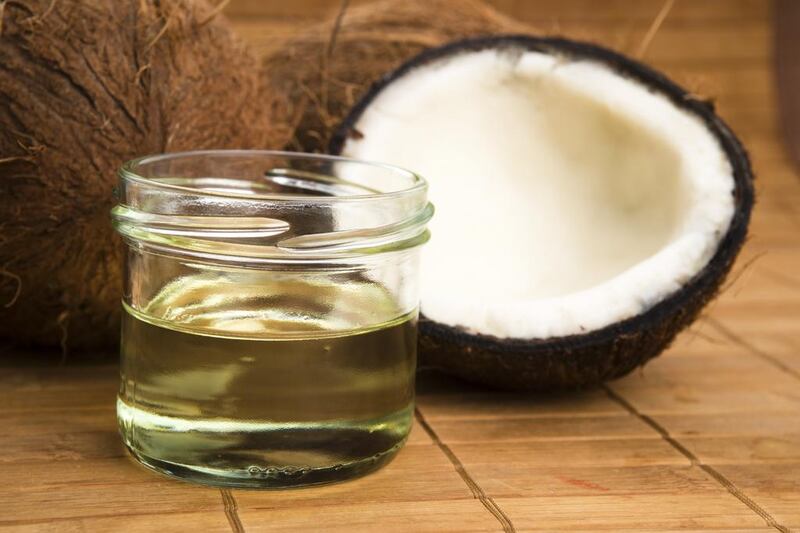For Gwyneth Paltrow and healthy-living "influencers" who have spent the past few years getting excited about coconut oil, a viral video of Dr Karin Michaels describing it as "one of the worst foods you can eat" must have made for awkward viewing.
Speaking in German at the University of Freiburg, the Harvard professor announces that coconut oil has a higher saturated fat content than lard and no proven health benefits to humans. Her face grave, she concludes: “Coconut oil is pure poison.” Watched more than a million times, the video seems to have caught the imagination of those who had suspected that health claims for the oil had been overblown. “I use coconut oil on my face, on my skin and in my cooking,” Paltrow told E! Online in 2014.
For those of us who have spent the past few years stockpiling coconut oil, the way ahead is a little confusing. Does its saturated fat content mean that we should throw it all out, or is it safe in small doses? “For me, there is only one reason to use coconut oil: you can heat it to a very high temperature,” says Dubai-based nutritionist Caroline Bienert, who explains that most oils start to oxidise when used for cooking, which is thought by some to have a carcinogenic effect.
Other than that possible benefit over alternatives such as olive oil, coconut oil's high levels of saturated fat – typically 86 per cent – mean that few nutritionists endorse it. A recent New York Times survey found that while 75 per cent of the American public considered coconut oil to be healthy, only 37 per cent of nutritionists agreed. Bienert is in the "avoid" camp: "It's always a question of the dosage, but generally speaking, it is much healthier to skip all saturated fats," she says.
The case against coconut oil is that it raises cholesterol, which is linked with heart disease – the number one cause of death not just in the UAE, but globally. “High cholesterol means a high risk of having a stroke or heart attack,” says Bienert.
With a vast body of evidence to back that statement, the American Health Association last year recommended that saturated fats, including coconut oil and butter, should be replaced with healthier, polyunsaturated fats. For Rashi Chowdhary, however, the heart-health brigade are looking at things too simplistically. “The saturated fat in coconut oil is made up of seven different types of fatty acids,” the Dubai-based nutritionist posted on her Instagram feed as the controversy spiked.
The predominant fatty acid is lauric acid, which Chowdhary agrees increases “bad” LDL cholesterol, but has also been shown to raise “good” HDL cholesterol. “It’s also antimicrobial,” she adds. “It gets into your body, converts to monolaurin and kills bacteria, pathogens, etc, in your gut.”
Coconut oil also contains oleic acid, a monounsaturated fat that is believed to have anti- carcinogenic properties, and linoleic acid, a polyunsaturated fatty acid that is good for hair, nails, bones and brain health.
For these reasons, Chowdhary urges her followers to include coconut oil in a balanced diet with plenty of vegetables. “Please stick to eating good fats from a mix of ghee, coconut oil, grass-fed butter, a few nuts (if you aren’t sensitive), avocados, coconut meat, etc.”
She's backed up by Ruba El- Hourani, senior and head clinical dietitian at RAK Hospital in Ras Al Khaimah. "Virgin coconut oil does contain around 90 per cent saturated fat but, remaining unprocessed, the majority of these saturated fatty acids are medium-chain fatty acids, which in turn are considered really healthy," El-Hourani comments. "Furthermore, 50 per cent of coconut oil contains lauric acid, which is also found in mothers' milk."
So was Paltrow right all along? All three experts agree that dosage is important – too much of any saturated fat is not good. “It is recommended to consume no more than two tablespoons of coconut oil [30ml] per day,” says El-Hourani.
For those who are convinced of its benefits, coconut oil is best consumed raw, but may also be used in cooking and baking. Those who have or are at risk of developing a heart disease, should proceed with more caution.
While Bienert is less convinced, she is also yet to meet a health-conscious, clean-eating client whose cholesterol was raised by coconut oil. Instead, the most common cause of high cholesterol in Dubai is “too many sweets, too many simple carbs, too many deep-fried foods, too much fast food, too much processed food, too many soft drinks, too few veggies, too little natural food, not enough fresh cooking at home and too little movement”.
Poison comes in many forms, but it's doubtful that Michels has had the last word. The preliminary results of a study by BBC's Trust Me, I'm a Doctor showed that people who consumed coconut oil daily for four weeks saw an increase in their HDL cholesterol than those who consumed olive oil. And the pendulum swings again.
__________________
Read more:
Work out when, where and how you want, with ClassPass
Yasmin Karachiwala: the woman responsible for shaping some of the best bodies in Bollywood
UAE residents share their tips for how to train for a desert race
__________________






